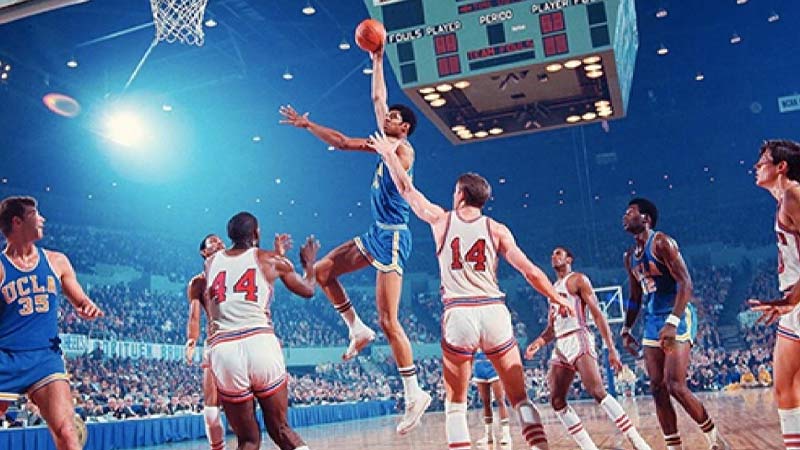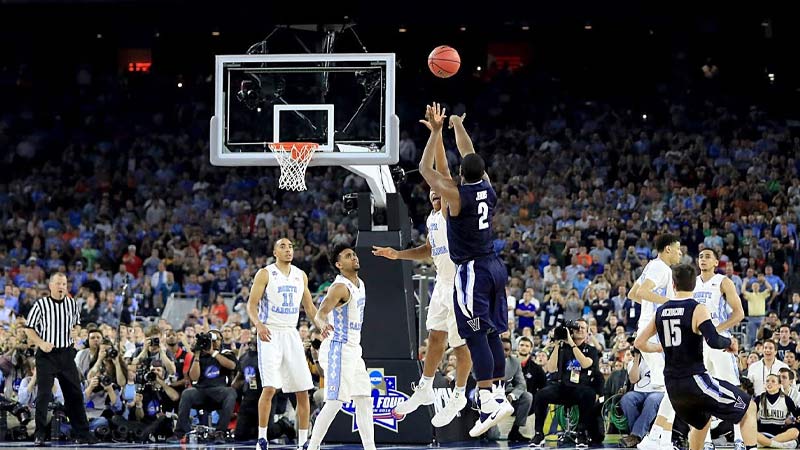March Madness, the annual NCAA Division I Men’s Basketball Tournament, captivates millions of fans across the country with its thrilling games and electrifying atmosphere.
Behind the scenes, an intricate process takes place to select the venues that will host this iconic tournament. The selection of March Madness venues is no small feat, considering the need for suitable facilities, geographic diversity, fan experience, and more.
In this blog post, we will explore the fascinating process of how March Madness venues are chosen. From the criteria considered by the NCAA selection committee to the impact on teams, fans, and host cities, we’ll uncover the secrets behind selecting the perfect stage for Madness.
The Significance of Venue Selection in March Madness
The success and excitement of the March Madness tournament extend beyond the on-court action. A critical aspect that contributes to the overall experience is the selection of suitable venues.
Venue selection plays a crucial role in determining the atmosphere, accessibility, and fan engagement throughout the tournament. Moreover, it can impact the performance and motivation of the participating teams. In this section, we will delve into the significance of venue selection in March Madness.
Enhancing the Fan Experience
March Madness is renowned for its passionate fan base. Choosing the right venues can amplify enthusiasm and create a memorable experience for spectators.
The atmosphere created by thousands of cheering fans can elevate the excitement of the games, creating an electric environment that energizes the players and amplifies the intensity of the competition. The selected venues should provide ample seating capacity, comfortable amenities, and effective acoustics to enhance the fan experience.
Impact on Team Performance

Source: axios.com
The chosen venues can have a direct impact on team performance. The dimensions of the court, lighting conditions, and overall layout of the facility can influence gameplay and strategy.
Familiarity with a particular venue can provide a competitive advantage to teams that have previously played there. Additionally, the proximity of the venue to the teams’ home base can affect the level of support and the ease of travel, potentially influencing their performance.
Location and Accessibility
Geographical considerations are crucial when selecting March Madness venues. The tournament aims to showcase teams from different regions, and it is important to ensure fairness in terms of access and travel for both the teams and the fans.
Venues chosen in diverse locations allow for a wider fan base to attend games and create a sense of inclusivity. Additionally, accessibility in terms of transportation, parking, and nearby accommodations should be taken into account to facilitate the smooth operation of the tournament.
Facility Requirements
March Madness venues must meet specific facility requirements set by the NCAA. These requirements include sufficient seating capacity to accommodate a large number of fans, locker rooms equipped to meet teams’ needs, media facilities for press coverage, and adequate amenities for spectators.
Ensuring that the venues can cater to these essential elements guarantees a smooth and comfortable tournament experience for all stakeholders.
Showcasing Host Cities
The selection of venues also provides an opportunity to highlight and promote host cities. March Madness brings significant economic benefits to the host cities through increased tourism, hotel bookings, and local spending.
By choosing venues in various cities across the country, the NCAA can distribute these economic benefits and showcase the unique aspects of each host city, creating a positive impact on local businesses and communities.
Venue selection is a critical aspect of organizing a successful March Madness tournament. The chosen venues significantly contribute to the fan experience, impact team performance, and play a role in showcasing host cities.
By carefully considering factors such as fan engagement, accessibility, facility requirements, and location, the NCAA ensures an exciting and inclusive tournament that captivates fans and provides a level playing field for the participating teams.
How Does NCAA Select the Venue of March Madness

Source: ncaa.com
The selection process for March Madness venues is carried out by the NCAA (National Collegiate Athletic Association) through its Division I Men’s Basketball Committee.
The committee is responsible for overseeing the entire tournament, including the selection of host cities and venues. Here is an overview of how the NCAA selects the venue for March Madness:
Bid Process
The NCAA initiates a bid process where cities and venues interested in hosting the tournament submit their proposals. The bidding cities usually include a mix of past host cities, as well as new contenders aiming to showcase their facilities and attract the economic benefits associated with hosting March Madness.
Venue Criteria
The NCAA has established a set of criteria that venues must meet to be considered for hosting March Madness games. These criteria include:
Sufficient Seating Capacity
Venues must have the capacity to accommodate a significant number of fans, typically ranging from 15,000 to 20,000 or more spectators.
Facility Amenities
The venues should provide adequate amenities such as locker rooms, media facilities, concessions, and parking to meet the needs of teams, officials, media personnel, and spectators.
Court Dimensions and Lighting
The court dimensions and lighting should adhere to NCAA standards to ensure fairness and optimal playing conditions for the teams.
Accessibility
Venues should be easily accessible, considering factors such as transportation options, proximity to major airports, and adequate parking for attendees.
Selection Committee Evaluation
The Division I Men’s Basketball Committee evaluates the bid proposals and assesses each venue’s suitability based on the established criteria. The committee examines the venues’ capacity, infrastructure, facilities, and overall ability to host a successful tournament.
Factors such as fan experience, geographic diversity, and economic impact on the host city may also be taken into consideration.
Site Visits
To gather more information and assess the venues firsthand, members of the selection committee may conduct site visits to the potential host cities.
These visits allow committee members to inspect the facilities, meet with local organizers, and evaluate the overall atmosphere and logistics of the proposed venues.
Committee Decision
Based on the evaluation of the bid proposals and site visits, the Division I Men’s Basketball Committee deliberates and makes a final decision on the host cities and venues for March Madness. The committee aims to select a combination of venues that provide a diverse and exciting tournament experience for teams and fans.
Announcements
Once the decisions are made, the NCAA announces the selected host cities and venues for the upcoming March Madness tournament. The announcement is typically made well in advance to allow the host cities and venues to prepare for the event and market ticket sales to the public.
It’s important to note that the selection process is subject to review and adjustments by the NCAA and may evolve over time to adapt to changing needs and priorities.
The NCAA’s venue selection process aims to ensure that March Madness is hosted in top-notch facilities that meet the requirements of teams, officials, media, and fans while providing an exceptional experience for all involved.
Facility Requirements for Venue Selection in March Madness
When selecting venues for March Madness, the NCAA (National Collegiate Athletic Association) sets specific facility requirements that potential host cities and venues must meet.
These requirements are in place to ensure that the venues can adequately accommodate the needs of the participating teams, officials, media, and spectators. Here are some common facility requirements considered during the venue selection process for March Madness:
Seating Capacity
Venues must have sufficient seating capacity to accommodate a large number of fans. The exact capacity may vary, but it typically ranges from 15,000 to 20,000 or more. This allows for a significant number of spectators to attend the games and creates an exciting atmosphere.
Court Dimensions
The basketball court dimensions must adhere to NCAA standards. The playing surface should be regulation size, including the length, width, and three-point line measurements. Ensuring consistent court dimensions across all venues helps maintain fairness and uniformity throughout the tournament.
Locker Rooms
Venues must provide adequate locker room facilities for the participating teams. These locker rooms should be spacious enough to accommodate the players, coaches, and support staff. They should also include amenities such as showers, benches, and storage space for equipment.
Media Facilities
March Madness attracts significant media coverage, so venues must have appropriate media facilities. These facilities should include press conference rooms, interview areas, and working spaces for journalists and broadcasters. Having well-equipped media facilities allows for efficient media coverage and communication during the tournament.
Amenities
Venues are expected to provide amenities that enhance the overall experience for teams and spectators. These amenities may include concessions stands, restrooms, merchandise areas, and designated areas for pre-game warm-ups. Additionally, venues must have accessible seating options for individuals with disabilities.
Parking and Transportation
Venues should have sufficient parking facilities or access to nearby parking options to accommodate the expected number of attendees. Accessibility to public transportation, such as buses or trains, is also taken into consideration to facilitate transportation for fans and minimize congestion around the venue.
Security and Safety
The safety and security of participants and spectators are of paramount importance. Venues must have appropriate security measures in place, including trained staff, surveillance systems, and emergency response protocols. Ensuring a safe environment allows everyone to enjoy the tournament without concerns about their well-being.
These facility requirements serve as guidelines for evaluating potential venues and determining their suitability to host March Madness games.
Meeting these requirements helps ensure that the tournament runs smoothly and provides a comfortable and enjoyable experience for all involved.
It’s worth noting that specific details and additional requirements may be communicated directly to potential host cities and venues during the bidding and selection process, allowing for more tailored considerations based on the particular needs of each tournament.
What Are the Venues of March Madness in 2023
March Madness in 2023 features various venues across the United States for different stages of the tournament. Here is a list of the venues for the 2023 NCAA Division I Men’s Basketball Tournament:
First Four
- University of Dayton Arena – Dayton, Ohio
First and Second Rounds
- Legacy Arena – Birmingham, Alabama
- Wells Fargo Arena – Des Moines, Iowa
- Amway Center – Orlando, Florida
- Golden 1 Center – Sacramento, California
- MVP Arena – Albany, New York
- Nationwide Arena – Columbus, Ohio
- Ball Arena – Denver, Colorado
- Greensboro Coliseum – Greensboro, North Carolina
Regional Semifinals (Sweet Sixteen) and Finals (Elite Eight)
- West Regional: T-Mobile Arena – Las Vegas, Nevada
- East Regional: Madison Square Garden – New York, New York
- Midwest Regional: T-Mobile Center – Kansas City, Missouri
- South Regional: KFC YUM! Center – Louisville, Kentucky
- National Semifinals (Final Four) and Championship:
- NRG Stadium – Houston, Texas
These venues were selected based on their capacity, amenities, and suitability for hosting March Madness games. Each venue contributes to the overall tournament experience and provides a unique atmosphere for players and fans alike.
It’s worth noting that the University of Dayton Arena hosts the First Four games annually, while the other venues are chosen for specific rounds and regions of the tournament. The Final Four and Championship games will take place at NRG Stadium in Houston, which has previously hosted the Final Four in 2011 and 2016.
Television rights for the tournament are held by CBS Sports and Turner Sports, with games broadcast on CBS, TBS, TNT, and truTV. Radio rights are exclusively held by Westwood One.
These venues and their respective host institutions or conferences play a crucial role in ensuring the success of the 2023 March Madness tournament.
FAQs
What factors does the NCAA selection committee consider when choosing March Madness venues?
The NCAA selection committee considers several factors when choosing March Madness venues. These include seating capacity, facility amenities, court dimensions, location and accessibility, geographic diversity, past hosting history, and economic impact on the host city.
The committee aims to select venues that can accommodate a large number of fans, provide necessary facilities for teams and media, meet NCAA standards for court dimensions, ensure fair representation across different regions, and contribute positively to the local economy.
How does geographic diversity play a role in the venue selection process?
Geographic diversity is an important consideration in the venue selection process. The NCAA seeks to ensure that teams from various regions have the opportunity to play on their home turf or in locations accessible to their fan base.
By selecting venues in different parts of the country, the tournament can attract fans from various areas, create a sense of inclusivity, and showcase the tournament’s popularity nationwide.
Do past host cities have an advantage in securing March Madness venues?
Past host cities do have an advantage in securing March Madness venues. The NCAA values experience and successful track records in hosting the tournament.
Cities that have previously demonstrated their ability to provide a well-organized event with excellent facilities, fan engagement, and positive economic impact are often favored in the selection process.
However, the committee also strives to include new host cities to keep the tournament fresh and offer opportunities for different regions to showcase their capabilities.
How do the facility requirements differ for the different rounds of the tournament?
The facility requirements may vary depending on the different rounds of the tournament. In the early rounds, such as the First Four and First and Second Rounds, venues must have sufficient seating capacity, appropriate locker rooms, media facilities, and amenities for teams and spectators.
As the tournament progresses to the Regional Semifinals and Finals, the venues must meet the same requirements while also accommodating the higher stakes of the Sweet Sixteen and Elite Eight games.
What impact do March Madness venues have on the local economy and community?
March Madness venues have a significant impact on the local economy and community. Hosting the tournament brings increased tourism, hotel bookings, restaurant traffic, and spending on merchandise, benefiting local businesses and stimulating the economy.
Moreover, the tournament showcases the host city’s amenities, attractions, and hospitality, potentially attracting future events and visitors.
Wrapping Up
The selection of March Madness venues is a meticulous process that involves evaluating various factors to ensure an exceptional tournament experience. From seating capacity and facility requirements to geographic diversity and economic impact, the NCAA selection committee takes multiple aspects into account.
The chosen venues not only host thrilling basketball games but also contribute to the unique atmosphere and fan engagement that make March Madness unforgettable. As fans eagerly await each tournament, the behind-the-scenes work in selecting the venues is crucial in shaping the magic of March Madness.
So, when you witness the madness unfold on your TV screens, remember the careful considerations that went into choosing the perfect arenas for this beloved tournament.







